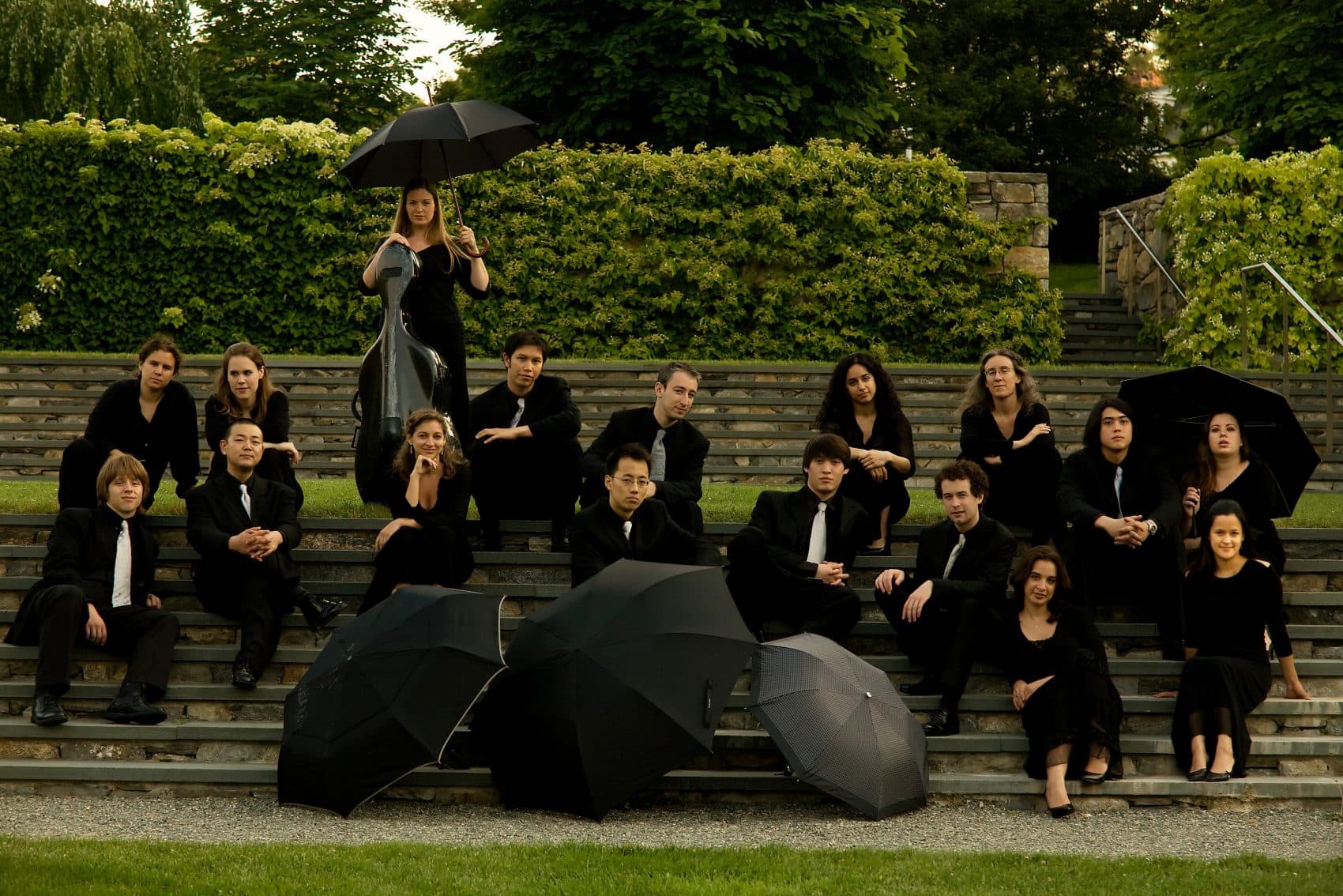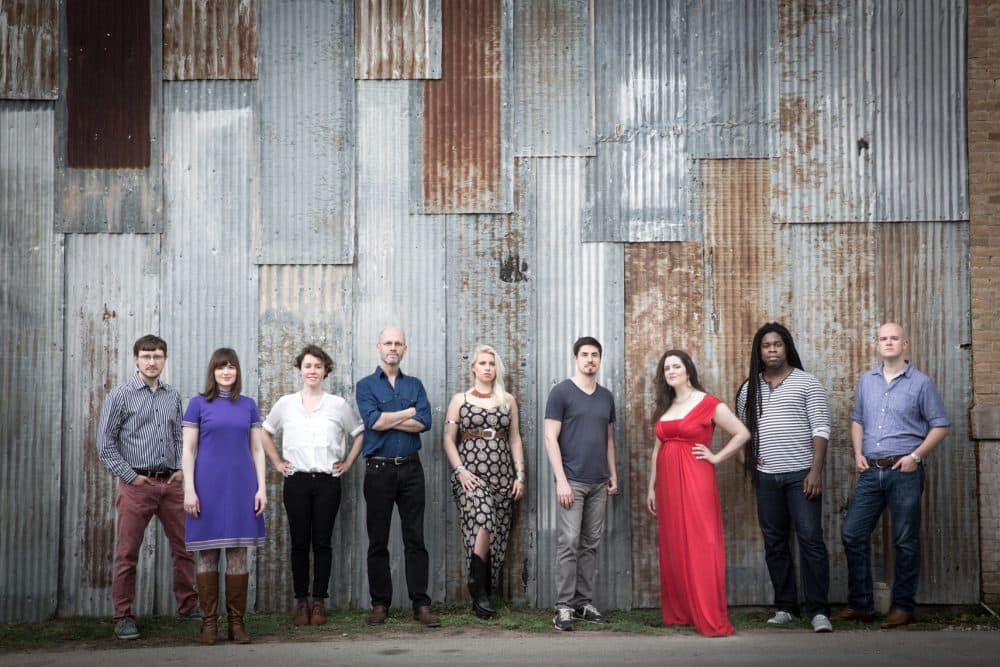Advertisement
Ensembles Collide — Roomful Of Teeth And A Far Cry Take Stage For Celebrity Series

Grammy nominations. Pulitzer Prizes. High-profile residencies. These rewards are normally reserved for an older generation of musicians — but no longer.
It’s a changed world for classical players, and two groups — the string collective A Far Cry and the vocal ensemble Roomful of Teeth — epitomize the changes. The ensembles take the Sanders Theatre stage together this Thursday, April 13, for a live performance that should serve both as musical and business models for all aspiring players.
Gone are the days when a conservatory musician either got a job in an orchestra, hit the jackpot as a touring soloist — or just gave up. As pianist Emanuel Ax, perhaps the embodiment of success of that earlier generation, reminisced recently, “In those days either you made it — or it was tough.”

Musicians are entrepreneurs now, and while orchestras still hire, and soloists still go from airport to stage to airport, most musicians make a living by juggling multiple gigs.
Miki-Sophia Cloud is one of them. The violinist is a long-time member of A Far Cry. She’s part of the Solera Quartet. She just finished a long-time position as artistic director of the White Mountains Music Festival. She has a cadre of music students at Dartmouth College. All of these are important affiliations.
Cloud’s colleagues in A Far Cry are no different — all of them chamber musicians, orchestral freelancers, teachers, collaborators. But that doesn’t mean their commitment to the ensemble is less than complete, and it certainly has had no impact on the group’s success.
Based in Boston, the Criers have toured extensively. Their recordings have had a huge impact — 2014’s “Dreams & Prayers,” self-released of course, was nominated for a Grammy. And their collaborations — with dance companies, world music stars, Yo-Yo Ma — reflect their business sense, and their eclecticism.
A Far Cry has seventeen string players and no conductor. But calling them “conductorless” brings a quick correction. “We’re self-conducting,” Cloud says. She’s a little breathless, working her way to the bus, on her way to a rehearsal for the group’s concert at the Gardner Museum, where it is the ensemble-in-residence.
“One of the strengths of the group is that it is collectively led,” she says. “I do think some of the things that the Criers do align with trends in the music business, but for us, it came about organically.
“We’ve had the ability to evolve,” she says. “We’re always questioning the process, and tweaking it. We learn from every concert. Our guest artists are always struck that after every project, we send an anonymous survey to all the players to get their feedback.”
The Criers came together in 2007, and some of the group’s dynamic has changed since then. “In the early days there was this long list of strict rehearsal rules,” Cloud says. “At first I thought, ‘Who are these people?’ Like you couldn’t stop playing unless a principal stopped you. And you couldn’t make more than two comments. And then there was the Spanker.”
The Spanker? “Every rehearsal had a Spanker,” Cloud says. “Their whole job was to police the rules, and yell ‘Spank’ if someone broke them, to make it impersonal.”
If it sounds discipline-bound, for a group that prides itself on its democratic approach — well, it was just part of the genesis.
“After a couple years, those rules hardly existed,” Cloud says. “We just got a feel for what was effective.”
It still can get complicated — especially when a group will perform the music of Bach just as readily as Osvaldo Golijov or Ted Hearne.
“Over the years we’ve formalized it a bit,” she says. “When the season begins we elect a group of principals for every piece. This year, I’m a leader for Bach and a follower for Brahms. That doesn’t mean that I’m passive; my job as a follower is to support the vision of my colleagues to the hilt.”
And so naturally, collegiality figures deeply in the joint concert with Roomful of Teeth. The pairing celebrates friendships and collaborations on many levels, including the music itself. The program offers compositions by Hearne and Roomful’s Caroline Shaw — the Pulitzer-winning composer and singer. Cloud was a college compatriot of both at Yale — premiering their early works, performing frequently with them.
Shaw’s work appears prominently on the program — not just her own compositions, but her careful arrangements of early works as well. And those works feature their own take on collegiality, stretching back to the Renaissance. Her arrangement of Josquin des Prez’s “Nymphes des bois” for the joint ensembles recasts a work that was written as a funeral lament, in honor of des Prez’s idol, Johannes Ockeghem.
Hearne’s “Law of Mosaics” explores the idea of colleagues even further. Hearne “samples” the work of composer Andrew Norman — another contemporary and friend — and others, building his own rich, detailed composition from the borrowed and then altered pieces.
The Sanders program, which alternates the ensembles performing together and separately, also includes Shaw’s “Music in Common Time,” Hearne’s “Coloring Book” and selections from new repertory by Roomful of Teeth, which will be announced from the stage.



